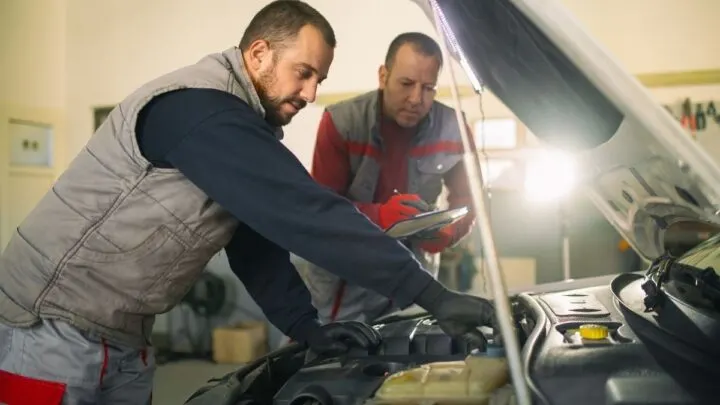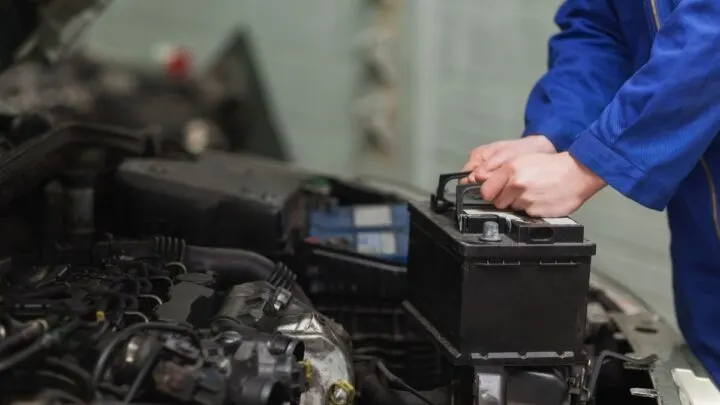A car battery stores the electric charge that powers your vehicle. As such, it’s an accessory that’s crucial to the working of both fossil-fuel and electric vehicles. However, as important as it is, battery prices have risen over the past decade.
And, if you’re wondering what’s the cause of such a price hike, you’re not alone. Well, here’s the answer!
Car batteries are so expensive due to increased sophistication in their production. Today, cars have more power-consuming accessories and features that need bigger batteries. Therefore, battery companies invest more in research and development, better raw materials, and comprehensive manufacturing processes to produce smaller but higher-capacity batteries.
In other words, technology comes at a cost!
The more we increase driver-assist and safety features in our cars, the more our power consumption, hence the need for a bigger battery. We don’t have the space to drive around with banks of batteries, thus the increasing preference for better, lighter, and maintenance-free ones!
Additionally, most battery buyers opt for absorbed glass mat (AGM) batteries as they have better reliability, are maintenance-free, and are light. The AGM depreciates less from repeated recharges and draining than the flooded batteries.
This preferable durability forced manufacturers to shift towards AGM batteries to meet the market’s demands.
Why Are EV Batteries So Expensive?
You might have heard that batteries are one obstacle that keeps the EV’s cost high. Electric vehicle batteries are different from the absorbed glass mat (AGM) or lead-acid batteries we use in our cars.
EVs use rechargeable lithium-ion (Li-ion) batteries that are bigger and hold greater charge compared to the ones in your laptops or phones.
And, for lithium-ion cells, the cathode comes across as the priciest component. The cathode materials such as manganese, cobalt, nickel, and lithium determine the battery’s capacity. And, they’ve always been expensive!
For example, the average price of a lithium-ion battery pack was $1,200 per kilowatt-hour (kWh) in 2010 compared to the current cost of $132/kWh.
Furthermore, for any EV battery cell, the following components contribute to the percentage price as follows: the cathode (51%), manufacturing and depreciation (24%), anode (12%), separator (7%), electrolyte (4%), and the housing (3%).
And to understand why the cathode is expensive, we need to know the working of a battery.
In brief, a battery has two electrodes, the positively charged anode, and the negatively charged cathode, immersed in an electrolyte. When discharging, electrons or negatively-charged ions shift towards the positive side through an external loop/ cable, completing the electrical circuit loop and powering your vehicle.
Therefore, holding on to more of these electrons without getting saturated is a determinant when choosing a cathode material. In effect, cathodes determine the EV’s thermal safety, range, and performance.
And not unless we come up with better higher capacity but cheaper cathode materials, the EV batteries will continue to be expensive.

Battery Replacement Prices & Cost Estimates
We all must replace our car batteries at some point. And as we’ve already seen, your habits will determine how often you’ll have to replace them.
Luckily, the battery is one of the more affordable accessories you can find in your car, and knowing its replacement costs beforehand saves you from getting scammed.
Here are the battery replacement prices!
A new vehicle battery replacement costs between $80 to $450 depending on whether you did the testing and replacement yourself or you opted for a mechanic. But typically, new batteries cost close to $50 to $120, while some specialty ones have higher $90 to $250 price tags.
The lead-acid battery is generally cheaper than the absorbed glass mat (AGM) battery and costs around $150 or less.
The AGM batteries cost around $200 upwards as they have a longer lifespan, are lighter, more durable, have faster recharges, and are maintenance-free.
However, their most significant downside is that they’re susceptible to overcharging compared to lead-acid batteries.

How Long Do Car Batteries Last?
The average lifespan of a car battery is three to five years, but this is an estimate, as other factors impact this figure.
Your car battery can last less than three years if you misuse it, but generally, it lasts four years under regular use.
In this case, normal means that the battery has a reliable alternator that goes through complete charge cycles operates at moderate temperature, and isn’t frequently attached to a ton of power-draining accessories.
There are a lot of elements that can shorten your battery’s lifetime, and here are some;
Factor #1 – Heat
Heat is one of the most prominent elements that quickly drains the life out of your battery.
For example, batteries in colder regions have an average lifespan of 55 months, compared to the 40 months you’ll get if you live in hotter areas.
And, on a typical room temperature day, a car battery loses close to 1/100 of a volt daily. It will lose close to one-third of its full charge in a month.
Heat increases the self-discharge rate significantly as it increases the chemical reactions within the battery.
Factor #2 – Inactivity
Short periodic trips and leaving the battery in your car for extended periods weaken it.
A car battery lasts for about four or five weeks when parked, depending on your vehicle and its state. And why is it so?
Even when sitting idle in the hood, the battery still powers your car’s alarm and computer systems.
Therefore, if your vehicle is safe and secure, it’s better to disconnect and store the battery in a cool, dry, and well-ventilated location. If initially fully charged, a disconnected battery lasts up to six months.
Factor #3 – Your Driving Habits
The habit of leaving your interior lights on or the key in the ignition for extended periods shortens your battery’s lifespan significantly.
When leaving your car, ensure that the lights are off, and you’ve removed the key from the ignition.
Also, it’s okay to drive while using power-draining features such as lights and A/C since the battery charges as you’re driving.
The alternator in your car’s hood converts the engine’s mechanical energy to electrical energy, charging the battery.
Final Remarks On Car Battery Cost
I wouldn’t say that car batteries are so expensive, given that they last for close to five years when well maintained.
But generally, they’re getting more expensive as time goes by. And we can attribute this to the vehicle market’s preference for better, longer-lasting, and minimal maintenance batteries.
You can still find cheap batteries out there, but avoid them; go for one with an average warranty of more than 2 years, or preferably 3 to 4 years.
Finally, buy batteries from a mass supplier, as you’ll be sure that your battery hasn’t been sitting on the shelf for one or two years.
